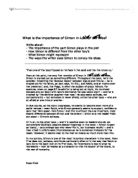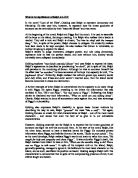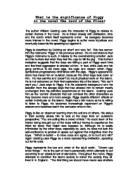law and order lord of the flies
Law and Order One of the first characters to emerge as a distinct personality is Piggy, who represents law and order. One of Piggy's first inspirations is brought about by the sight of a conch in a pool. When Ralph retrieves the conch, Piggy realizes that: "We can use this to call the others. Have a meeting". Piggy's first instinct is for organization, and the conch which he spots becomes a symbol of the fragile system of order that the boys create. Piggy is critical of the kind of freedom that leads to disorder and chaos. When the boys agree to build a fire on the mountain to send a smoke signal, the first meeting breaks up as everyone rushes towards the mountain. Like the crowd of boys, the fire quickly gets out of control, and one of the younger boys appears to be missing -probably trapped in the burning jungle. Piggy tells the others that they have acted "like a pack of kids!" and asks, "How can you expect to be rescued if you don't put first things first and act proper?" The only salvation Piggy can envision comes from behaving in an orderly manner. The degree to which he values this vision of order is shown by his reverence for the conch, which he attempts to protect from Jack later on in the book. Even when the majority of the boys have abandoned the original, organized society, Piggy clings to the shell, stubbornly believing that the beauty of order cannot be denied.
"Why Did William Golding Name His Novel 'The Lord of the Flies'?"
"Why Did William Golding Name His Novel 'The Lord of the Flies'?" Golding's novel comprises many elements of adventure and mystery, but the greatest question surrounding the novel is the very title itself. Unlike other authors, William Golding does not appear to have chosen an appropriate title that deduces the adventure and savagery of the novel, but it is only at a closer look that the title represents the true meaning of the novel. Although throughout the book the only reference to the title is by "The Lord of the Flies" its small part in the book plays an enormous part of the overall meaning of the novel. We are only introduced to it in chapter 8 'Gift for Darkness', where it is nothing more than the decapitated head of a sow lodged onto a stick. In the text it is described as a rather haunting image, which was: ..."grinning amusedly in the strange daylight, ignoring the flies, the spilled guts, even ignoring the indignity of being spiked on a stick." The author talks about the pig's head as if it is alive by using language such as "grinning". Also the way Golding writes "strange daylight" appears that the sow represents the darkness of life, as it is only in the comfort of light that the boys have vision to see it for what it really is. This is as the "Lord of the Flies" represents the fear of the boys for something imaginary, for the beast is nothing more than a
What is the importance of Simon in 'Lord of the Flies'
What is the importance of Simon in Lord of the Flies? Write about: - The importance of the part Simon plays in the plot - How Simon is different from the other boy's - What Simon might represent - The ways the writer uses Simon to convey his ideas. 'Then one of the boys flopped on his face in the sand and the line broke up.' Even at this point, the very first mention of Simon in The Lord of the Flies, Simon is marked out as something different. Throughout the book, he is the outsider. Inhabiting the 'dubious region' between biguns and littluns - he is singled out for his faints, as Jack says, 'In Gib.; and Addis; and at matins over the precentor,' and, like Piggy, is often the subject of group ridicule. For example, when on page 92 he admits to being out at night, his mumbled excuses are put down with Jack's dismissive 'he was taken short' - and he is crushed by 'the derisive laughter that rose.' He also seeks solitude, not companionship - but somehow is never afraid, unlike the other boys - who are all afraid at one time or another. In due course, as the story progresses, he seems to become even more of a social recluse - even Ralph, who Simon generally seems to support, confides to Jack that 'He's queer. He's funny.' And this is without the one important, most drastic difference between Simon and the others - which only the reader finds out about - Simon's
Lord Of The Flies - How Golding sets up readers expectations
How does Golding set up readers' expectation for the rest of the novel in the opening pages? In the first few pages of 'The Lord of The Flies' there is a lot of descriptive language used to describe the surroundings and how Ralph feels among certain objects and people. Golding uses many of these detailed descriptions to set up readers' to think what may happen later on in the novel. There are many key factors that can be linked with the island and also to what may still be to come for instance, there are two separate sides to the island. Another detailed description given is about Piggy. Piggy is a small orphaned boy who is fairly intellectual and sensible. He is somewhat stout, which could be to do with the fact he has had a sheltered life from his aunt, who gives him the sweets from the sweet shop she owns. However the significance of Piggy is his glasses. 'The fat boy looked down through the round spectacles'. This shows that the spectacles that Piggy wears a vital part of his life. Piggy's glasses symbolise civilisation and all that is modern. During their stay so far at the island, the boys run around, losing more and more of their clothes, whereas Piggy remains intact with his glasses and does not participate in any actions that are beyond what he would do at home. The glasses could also represent the intellectual side of life and the side of Ralph and himself that is
The symbolism of the beast in Lord of The Flies
The symbolism of the Beast & its significance to characters in LOTF In LOTF the beast is a symbol of fear, and is represented by Golding in many different ways. It is not only a physical thing, but also a presence within all of the boys, which creates an atmosphere of darkness, and horror. It is one of the signs that Golding uses to show that the island isn't as beautiful as it may seem, and that it has a dark side too. The beast is introduced when the littluns says that he has seen a "snake thing", describing it as "big and horrid." At first the beast is just a vague idea, and Simon says that the littluns scream in their sleep "as if it wasn't a good island." Highlights the dark side of the island. The main characters see the beast differently. As leader, Ralph tries to comfort the boys, by describing the idea of the beast as 'nonsense', which is helping the littluns come to terms with the idea. Jack almost undermines Ralph by saying that even if there was a beast "we'd kill it". This shows his hunter- gatherer quality. Piggy is the rational one, and says that "life is scientific", and that the beast doesn't exist. He gets close to the truth when he explains to the boys that it is possible to be "frightened of people." (The beast is within us all.) Simon is also very rational. He suggests that the only thing they should all fear is the savagery and evil in human nature.
Fear of the Unknown- Lord of the Flies
The Fear of the Unknown An important theme in William Golding's novel, 'Lord of the Flies' is that the fear, especially the fear of the unknown, is pervasive in mankind in such a way that even strong societies are too weak to protect their own people from the grasping power of it. In his novel, Golding illustrates this sense of fear that is found within every society and that can eventually lead to community or distress, disaster and human corruption. Let us first try and understand what is fear? Fear is a particular state of mind that can be originated either from a realistic circumstance or a sense of uncertainty. The fear of realistic origin could be resolved by removing root cause with time and effort. But the fear of uncertainty has the strong grasping power to which any human may succumb, however strong he is. It has a seating effect on our sub-conscious which is very difficult to get rid off. In this novel, this fear of uncertainty started off when a little one with a mulberry-coloured birthmark announced the existence of the beastie. "He says he saw the beastie, the snake-thing, and will it come back tonight?" "He says in the morning it turned into them things like ropes in the trees and hung in the branches." Even though this first fear was neglected by most of the big ones, especially Jack and Ralph who kept on saying that no such thing existed, but it still left
In the novel Lord of the Flies, Golding uses Ralph to represent democracy and friendship.
What is the significance of Ralph in LOTF In the novel "Lord of the Flies", Golding uses Ralph to represent democracy and friendship. He also uses him, however, to represent how the innate goodness of someone can be overridden by their "essential illness" and vice versa. At the beginning of the novel, Ralph and Piggy find the conch. It is used to assemble all the boys on the island, forming a meeting. It is Ralph who realises that a leader is needed. They call a vote and Ralph is chosen, "Let him be chief with the trumpet thing". Yet, in-spite of his power, Ralph chooses to delegate. He evidently realises how Jack needs to be kept occupied. He also realises that Simon is vulnerable, so invites him along to explore the island. Ralph's ability to judge characters, delegate power, and rule using democracy, represents how he was the perfect leader, and how without him, society would inevitably have collapsed immediately. Golding explores "man-kinds essential illness" and uses Ralph to express his ideas. Ralph's appearance is described as proclaiming "no devil", yet in-spite of this, Ralph still partakes in the murdering of Simon. Although he tries to convince himself that the affair was "an accident" he becomes aware of the boys true capacity for evil, "I'm frightened. Of us". Evidently, Ralph realised that without grown-ups, anarchy would (and did) strike, and if
What is the significance of Piggy in the novel The Lord of the Flies?
What is the significance of Piggy in the novel The Lord of the Flies? The author William Golding uses the character of Piggy to relates to certain themes in the novel. He is linked closely with civilisation, time and the conch which itself represents order. As savagery becomes more intense in the novel, Piggy begins to suffer more injustices and eventually loses his life speaking out against it. Piggy is described by Golding as 'short' and very 'fat'. This has earned him the nickname 'Piggy' in his previous school. It's no coincidence that Piggy's nickname is such, it relates to the overwhelming emotion Jack and his hunters feel when they feel the urge to 'kill the pig'. This indirect metaphor suggests that the boys are killing a part of Piggy each time and that their aggression is directed at him. In fact, while Jack and his gang continue to kill more pigs, the logic and reason which Piggy symbolizes progressively diminishes with the pigs. Piggy's appearance alone has made him an outsider, because the other boys look down on him. He has asmtha and doesn't do much physical work on the island. He is not welcomed on their first exploratory trip of the island. "We don't want you," Jack says to Piggy. It is his academic background and his isolation from the savage boys that had allowed him to remain mostly unchanged from his primitive experiences on the island.
What particular aspects of human nature are explored in Lord of the Flies; and how have the author's techniques and choice of content deepened your understanding of this matter?
What particular aspects of human nature are explored in Lord of the Flies; and how have the author's techniques and choice of content deepened your understanding of the matter? In this essay, I will review the information I have gathered from the novel 'Lord of the Flies' by William Golding. The main aspects of human nature explored are: Evil within man, Fear of the unknown, and The need for civilisation. In the story, a group of schoolboys land on a deserted island due to a plane crash. They quickly set up a community and the boys are united in their quest for rescue. However, the lack of civilisation eliminates any common rules or morals, and the group soon starts to break apart. This brings out the evil which is within every human being. The constant fear of the unknown, represented as a 'beast', only increases the magnitude of this problem. Finally, the camp is split into two: The rebellious and 'evil' side, led by Jack; and the civilised and 'good' side led by Ralph, the original chief. The rivalry between Jack and Ralph forces this split, and their different opinions and priorities. This division finally results in the brutal murders of Simon and Piggy, with Ralph escaping narrowly from the clutches of Jack's tribe. William Golding uses characterisation to show the fear of the unknown in real life. The boys seem to have seen, or at least felt the presence of, a
Lord of the Flies, on the surface, may resemble any other children adventure story. Beyond its literal sense, however, it actually has a lot more to offer: it is an attempt to unfold the superficiality and fragility of civilization, a pessimistic an
"And in the middle of them, with filthy body, matted hair, and unwiped nose, Ralph wept for the end of innocence, the darkness of man's heart, and the fall through the air of the true, wise friend called Piggy..." Written in 1954, when the world was trapped in a state of utter confusion and disarray as a result of the aftermath left by World War Two as well as the unpredictable conditions brought by the Cold War, William Golding's "Lord of the Flies" is an allegorical novel that centers on the darkest depths of human souls. "Lord of the Flies", on the surface, may resemble any other children adventure story. Beyond its literal sense, however, it actually has a lot more to offer: it is an attempt to unfold the superficiality and fragility of civilization, a pessimistic and dark commentary on our innate human nature and a downright challenge to the deep-rooted societal belief that children, British children in particular, must be naturally virtuous. Such unprecedented thematic focus, together with the extraordinary degrees of political realism portrayed symbolically in the novel, make "Lord of the Flies" a truly brilliant, remarkable and ground-breaking classic of all time. The novel opens with a group of British schoolboys who find themselves stranded on an unidentified Pacific island after a serious plane crash. With no adult surviving the crash, the boys are left to fend




























